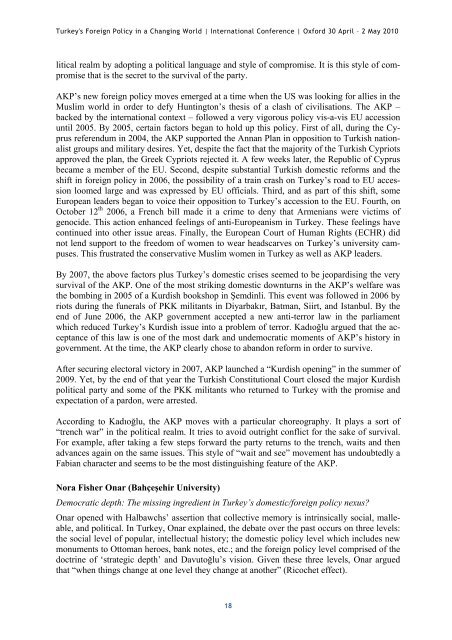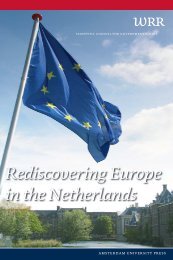Turkey's Foreign Policy in a Changing World - St Antony's College ...
Turkey's Foreign Policy in a Changing World - St Antony's College ...
Turkey's Foreign Policy in a Changing World - St Antony's College ...
You also want an ePaper? Increase the reach of your titles
YUMPU automatically turns print PDFs into web optimized ePapers that Google loves.
<strong>Turkey's</strong> <strong>Foreign</strong> <strong>Policy</strong> <strong>in</strong> a Chang<strong>in</strong>g <strong>World</strong> | International Conference | Oxford 30 April – 2 May 2010<br />
litical realm by adopt<strong>in</strong>g a political language and style of compromise. It is this style of compromise<br />
that is the secret to the survival of the party.<br />
AKP’s new foreign policy moves emerged at a time when the US was look<strong>in</strong>g for allies <strong>in</strong> the<br />
Muslim world <strong>in</strong> order to defy Hunt<strong>in</strong>gton’s thesis of a clash of civilisations. The AKP –<br />
backed by the <strong>in</strong>ternational context – followed a very vigorous policy vis-a-vis EU accession<br />
until 2005. By 2005, certa<strong>in</strong> factors began to hold up this policy. First of all, dur<strong>in</strong>g the Cyprus<br />
referendum <strong>in</strong> 2004, the AKP supported the Annan Plan <strong>in</strong> opposition to Turkish nationalist<br />
groups and military desires. Yet, despite the fact that the majority of the Turkish Cypriots<br />
approved the plan, the Greek Cypriots rejected it. A few weeks later, the Republic of Cyprus<br />
became a member of the EU. Second, despite substantial Turkish domestic reforms and the<br />
shift <strong>in</strong> foreign policy <strong>in</strong> 2006, the possibility of a tra<strong>in</strong> crash on Turkey’s road to EU accession<br />
loomed large and was expressed by EU officials. Third, and as part of this shift, some<br />
European leaders began to voice their opposition to Turkey’s accession to the EU. Fourth, on<br />
October 12 th 2006, a French bill made it a crime to deny that Armenians were victims of<br />
genocide. This action enhanced feel<strong>in</strong>gs of anti-Europeanism <strong>in</strong> Turkey. These feel<strong>in</strong>gs have<br />
cont<strong>in</strong>ued <strong>in</strong>to other issue areas. F<strong>in</strong>ally, the European Court of Human Rights (ECHR) did<br />
not lend support to the freedom of women to wear headscarves on Turkey’s university campuses.<br />
This frustrated the conservative Muslim women <strong>in</strong> Turkey as well as AKP leaders.<br />
By 2007, the above factors plus Turkey’s domestic crises seemed to be jeopardis<strong>in</strong>g the very<br />
survival of the AKP. One of the most strik<strong>in</strong>g domestic downturns <strong>in</strong> the AKP’s welfare was<br />
the bomb<strong>in</strong>g <strong>in</strong> 2005 of a Kurdish bookshop <strong>in</strong> Şemd<strong>in</strong>li. This event was followed <strong>in</strong> 2006 by<br />
riots dur<strong>in</strong>g the funerals of PKK militants <strong>in</strong> Diyarbakır, Batman, Siirt, and Istanbul. By the<br />
end of June 2006, the AKP government accepted a new anti-terror law <strong>in</strong> the parliament<br />
which reduced Turkey’s Kurdish issue <strong>in</strong>to a problem of terror. Kadıoğlu argued that the acceptance<br />
of this law is one of the most dark and undemocratic moments of AKP’s history <strong>in</strong><br />
government. At the time, the AKP clearly chose to abandon reform <strong>in</strong> order to survive.<br />
After secur<strong>in</strong>g electoral victory <strong>in</strong> 2007, AKP launched a “Kurdish open<strong>in</strong>g” <strong>in</strong> the summer of<br />
2009. Yet, by the end of that year the Turkish Constitutional Court closed the major Kurdish<br />
political party and some of the PKK militants who returned to Turkey with the promise and<br />
expectation of a pardon, were arrested.<br />
Accord<strong>in</strong>g to Kadıoğlu, the AKP moves with a particular choreography. It plays a sort of<br />
“trench war” <strong>in</strong> the political realm. It tries to avoid outright conflict for the sake of survival.<br />
For example, after tak<strong>in</strong>g a few steps forward the party returns to the trench, waits and then<br />
advances aga<strong>in</strong> on the same issues. This style of “wait and see” movement has undoubtedly a<br />
Fabian character and seems to be the most dist<strong>in</strong>guish<strong>in</strong>g feature of the AKP.<br />
Nora Fisher Onar (Bahçeşehir University)<br />
Democratic depth: The miss<strong>in</strong>g <strong>in</strong>gredient <strong>in</strong> Turkey’s domestic/foreign policy nexus?<br />
Onar opened with Halbawchs’ assertion that collective memory is <strong>in</strong>tr<strong>in</strong>sically social, malleable,<br />
and political. In Turkey, Onar expla<strong>in</strong>ed, the debate over the past occurs on three levels:<br />
the social level of popular, <strong>in</strong>tellectual history; the domestic policy level which <strong>in</strong>cludes new<br />
monuments to Ottoman heroes, bank notes, etc.; and the foreign policy level comprised of the<br />
doctr<strong>in</strong>e of ‘strategic depth’ and Davutoğlu’s vision. Given these three levels, Onar argued<br />
that “when th<strong>in</strong>gs change at one level they change at another” (Ricochet effect).<br />
18

















